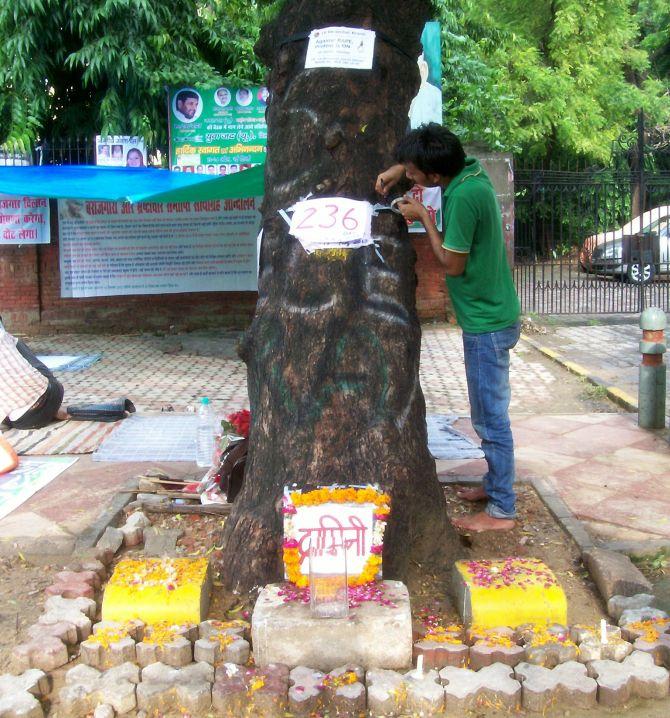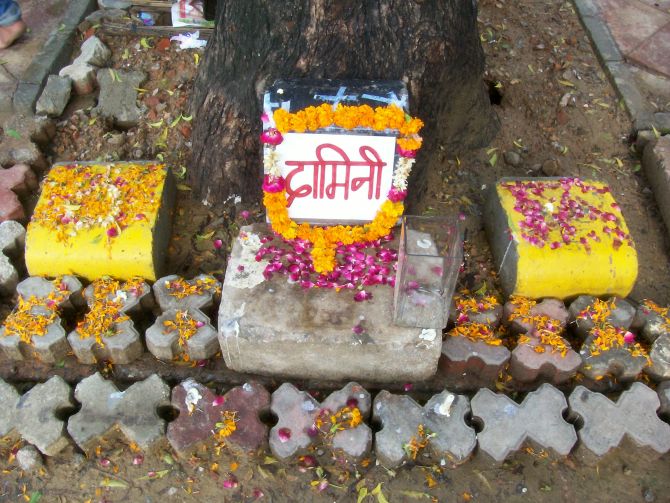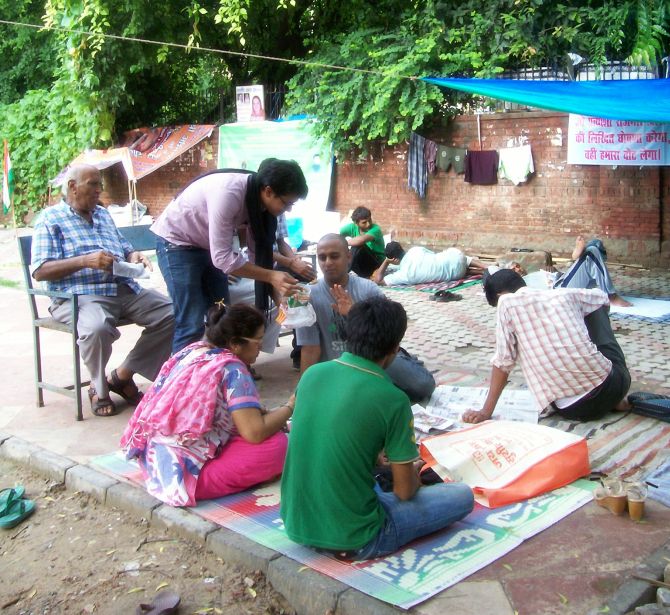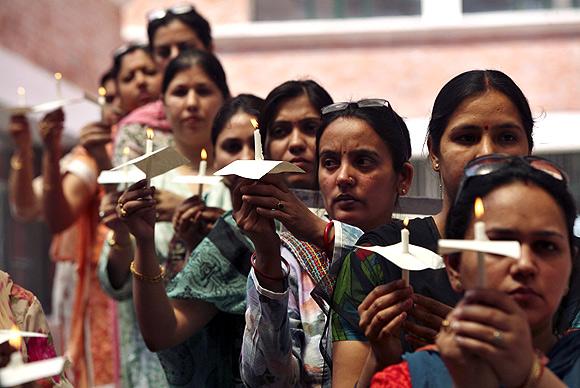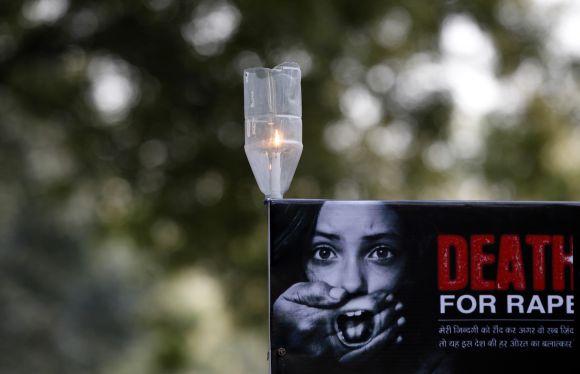 | « Back to article | Print this article |
9 months on, protests continue every day over Delhi gang rape
Nearly nine months after the horrific gang rape in Delhi, the tens of thousands of protestors who took to the streets across India have returned to their lives (barring a brief moment of outrage during the Mumbai gang rape on August 22). There is, however, a small group in Delhi, who work the streets in protest over crimes against women -- every single day since December 16. Swarupa Dutt tells their story
They sit under a neem tree every day waiting for death. The death of five men -- four adults and a juvenile -- accused in the gang rape and murder of a 23-year-old physiotherapist in Delhi in December 2012.
They come to this spot at Jantar Mantar Road every single day -- for the last 250 days -- ever since the protests over the Delhi gang rape began nearly nine months ago. The rest of India stopped protesting in January.
They are students, retired professionals (teachers, government servants, bank clerks and housewives who, till December 17, had never participated in a protest march. Police brutality, tear gas shells, water cannons, lathi charges were best left to Bollywood or activists, they believed.
Click NEXT to read further...
'I couldn't sleep after I read how the girl was brutalised'
On the 27th, Damini (as they choose to call the Delhi gang-rape victim), was still alive. That night, I read about how a rod had been used to brutalise her and I couldn’t sleep. The next day, I went to Jantar Mantar and have been here ever since," says Vikas Tyagi, 31.
“We did not know each other. Some of us went along with other protest groups or as individuals when we heard of the rape on TV. First it was disbelief, then blind rage. I was on the streets in the morning till 10 pm raising slogans outside (Congress President) Sonia Gandhi and (Delhi CM) Sheila Dikshit’s house,” says Tyagi
He was one among tens of thousands across India -- men and women -- whose month-long protests and the incessant 24x7 media blitz led to amendments in the criminal law for sexual assaults of extreme nature against women, apart from long-demanded reforms in policing.
In Delhi, protestors held peaceful candlelight marches across the city. Protests were held outside the prime minister’s residence, vigils were kept at Jantar Mantar, India Gate and Raisina Hill. Police barricades were broken to reach Rashtrapati Bhawan. The movement gained momentum on December 29, when the girl died and for a month thereon when the trial began.
Click NEXT to read further...
Protestors draft 10-point list of demands to root out crimes against women
Nearly nine months later, Jantar Mantar Road is quiet. Under the neem tree where they sit, is a small makeshift memorial to Damini. An A4 paper marking the number of days of protest is pinned to the trunk of the tree. A garlanded paper that reads 'Damini' and a few candles, and scattered flower petals are placed under the tree. It is at best a blink-and-miss memorial. Perhaps, the young woman who died would have frowned at the attempt at deification.
Explains Chandan Kumar, who has been part of the group since December, “Whether you like it or not, she has become a pivot for those who are fighting crimes against women. We did not plan this, it just happened. We met on the streets and on December 24 we decided that her parents fight to get justice should be kept alive. We called our group ‘16 December Kranti’ and laid down a 10-point list of demands that would help root out crimes against women.”
The group says it is fighting for women’s rights. They want the death sentence for all rapists, including the five accused in this case, no immunity for juvenile rapists, no mercy petitions for rape, fast-track courts, stricter laws to curb marital rape, acid attacks and better policing. They say that even if the verdict is the death sentence for the accused, their protest will continue till all the 10 points in their list of demands are met.
Click NEXT to read further...
'High-pitched protests by the media can be counter-productive'
They sent their list of suggestions to the three-member Justice J S Verma member commission assigned to review laws for sexual crimes, made representations before various government bodies and staged street plays.
Till August 8, they protested 24x7, camping under the tree. But that night, the Delhi municipal corporation dismantled their tent and ever since it’s been a 12-hour protest from 9 am to 9 pm. On the 16th (the date she was raped and brutalised) and 29th (the date she died), the number of protestors increase.
But, admits Kumar, the numbers have dwindled and it’s rarely more than 20 people now. “I feel dispirited at times. Every day I tell myself I won’t come here tomorrow, but I’m back. The protests have given a sense of purpose to our lives,” he says.
Flavia Agnes, a women’s rights lawyer and founder of Majlis, an organisation for women’s rights that has worked with several rape survivors, says, “Protests are fine, but high-pitched protests by the media can be counter-productive. The Delhi gang rape received so much attention because of the brutality she underwent. I personally don’t go for any protests, but you have to be careful not to cross the line and intrude in the privacy of the woman.”
Click NEXT to read further...
'We feel we are making a difference to someone, however small'
This group in Delhi ensures that their protests are not high-pitched, but sustained. Says Usha Shukla, 45, a housewife, “We don’t know how long we can come here. It’s been over eight months since the rape and we are still here. We don’t know what will happen tomorrow.” But she believes their presence makes a difference.
“If one of us can’t come, we call someone else. But each of us try and come for a few hours every day. I’ve told these kids that we shouldn’t stay the night. You can create awareness during the day as well and protests must not be at the cost of your own safety,” she says.
In fact, just as interest was waning in the group, they bumped into Damini’s family at the fast-track court in Saket. Says Tyagi, “They had no idea that the protests were still on. Her mother was in tears and they said they were happy that strangers in this country were still thinking about their daughter.
“You know, that is what keeps us going. The thought that her family knows that the outrage against what happened to their daughter hasn’t died down. That this country is with them not just in spirit. Every day when we go home to our own lives, we feel we are trying to make a difference to someone, however small,” says Kumar.
TOP photo features of the week
Click on MORE to see another set of PHOTO features...
